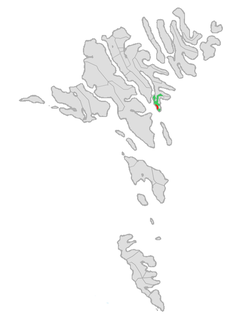
The Faroe Islands is served by an internal transport system based on roads, ferries, and helicopters. As of the 1970s, the majority of the population centres of the Faroe Islands have been joined to a single road network, connected by bridges and tunnels.
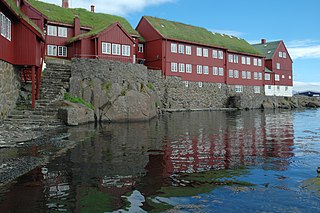
Tórshavn, usually locally referred to as simply Havn, is the capital and largest city of the Faroe Islands. It is located in the southern part on the east coast of Streymoy. To the northwest of the city lies the 347-meter-high (1,138 ft) mountain Húsareyn, and to the southwest, the 350-meter-high (1,150 ft) Kirkjubøreyn. They are separated by the Sandá River. The city itself has a population of 14,099 (2024), and the greater urban area has a population of 23,194, including the suburbs of Hoyvík and Argir.

Norðragøta, also just referred to as Gøta, is a village on Eysturoy island, Faroe Islands.

Toftir is a village in Nes Municipality on the island of Eysturoy, in the Faroe Islands. It is part of a chain of villages stretching over a distance of 10 kilometres on the east side of Skálafjørður (fjord) on Eysturoy island. The highest hill in Toftir, called Húkslond, is 129 metres high, and Nes Municipality is the only area in the Faroes which has no mountains above 200 metres.

Venceslaus Ulricus Hammershaimb was a Faroese Lutheran minister who established the modern orthography of Faroese – the language of the Faroe Islands – based on the Icelandic language, which like Faroese, derives from Old Norse.

Runavík is a comparatively urbanised village in Runavík Municipality, Faroe Islands. It lies on the south half of the isle of Eysturoy.
Gøtudanskt is a variety of Danish spoken in the Faroe Islands by Faroe Islanders. Its pronunciation is influenced by Faroese, the usual native language of Gøtudanskt speakers.

Oyndarfjørður is a village on the northeastern coast of the Faroese island of Eysturoy in the Runavíkar municipality.

Søldarfjørður is a village in the south of the Faroese island of Eysturoy in Runavík Municipality.

Oyri is a village on the central west coast of the Faroese island Eysturoy in the Sunda municipality.

Selatrað is a village on the west coast of the Faroese island of Eysturoy in Sjóvar Municipality. The name Selatrað refers to a breeding place for seals.
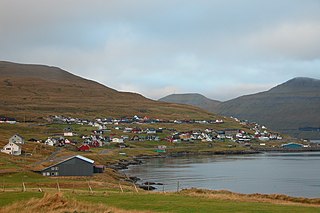
Strendur is a village on the Faroese island of Eysturoy, located along the Skálafjørður fjord. It is the seat and main settlement of the Sjóvar Municipality.

Nes is a village on the Faroese island of Suðuroy located in the municipality of Vágur. It is located west of Porkeri and east of Vágur.

The Church of the Faroe Islands, also known as the Faroese People's Church, is the established church and the largest religious organization in the Faroe Islands. It is an Evangelical Lutheran church, continuing the Lutheran tradition established during the Protestant Reformation. The church is one of the smallest state churches in the world. Prior to becoming independent on 29 July 2007, it was a diocese of the Church of Denmark, also a Lutheran church. As of 2024, 76.6% of Faroe Islanders belonged to the state church.

Fríðrikur Petersen was a noted Faroese Unionist politician and clergyman.

The Faroe or Faeroe Islands, or simply the Faroes, are an archipelago in the North Atlantic Ocean and an autonomous territory of the Kingdom of Denmark. The official language of the country is Faroese, which is closely related to and partially mutually intelligible with Icelandic.
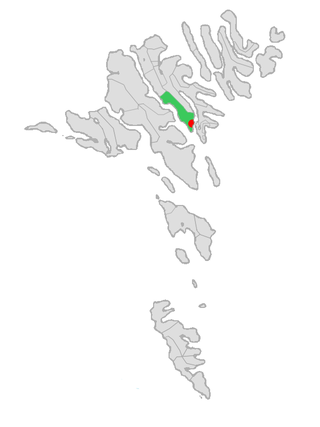
Sjóvar Municipality is a municipality of the Faroe Islands. The name of the municipality has its origins from the farm Sjógv á Strondum which gave name to Sjóvar parish. The name comes from the Faroese word for seawater (sjógvur). Sjóvar covers a part of the island of Eysturoy. It consists of the villages of Strendur, Innan Glyvur, Selatrað, Morskranes and Kolbanargjógv.
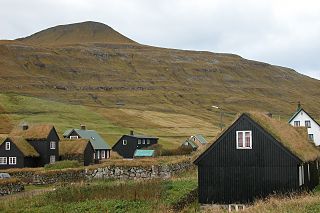
Heine Johnsøn Havreki (1514–1576) or Heine the shipwrecked was a Norwegian born-Icelandic Lutheran pastor who helped introduce the Protestant Reformation on the Faroe Islands.

Jógvan Poulsen was a Faroese teacher and writer, and a politician for the Union Party.

Eiði Municipality is a municipality of the Faroe Islands. It is part of the Eysturoy region, and consists of a northwesterly part of the Eysturoy island. The municipality borders Runavík Municipality to the east and Sunda Municipality to the south and east. The population of the municipality is 810 (2023). The mayor of the municipality is Rógvi Egilstoft, and the municipal council consists of seven members elected every four years.

